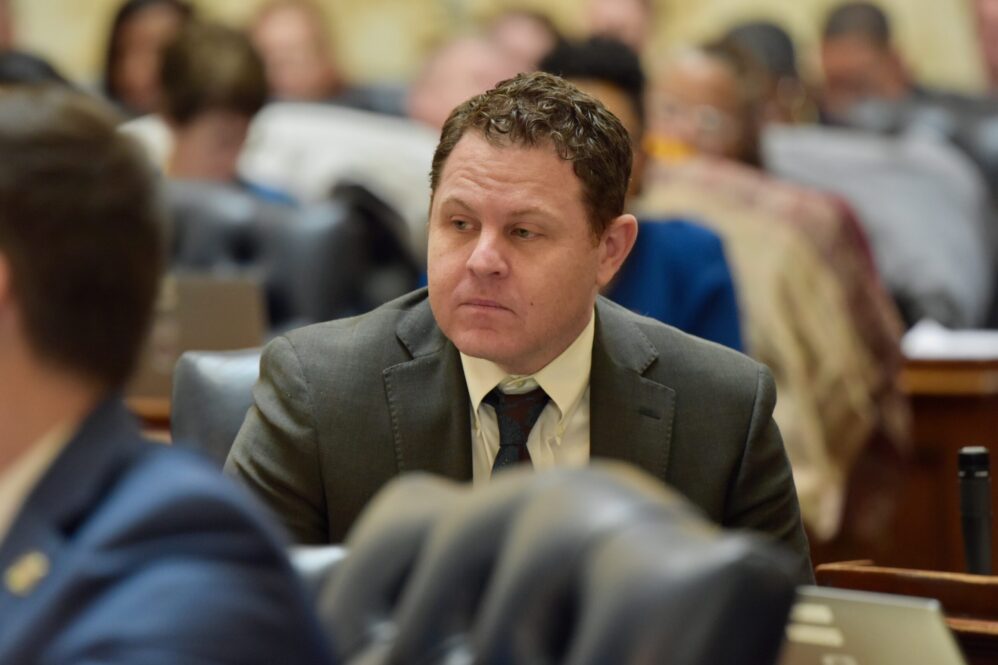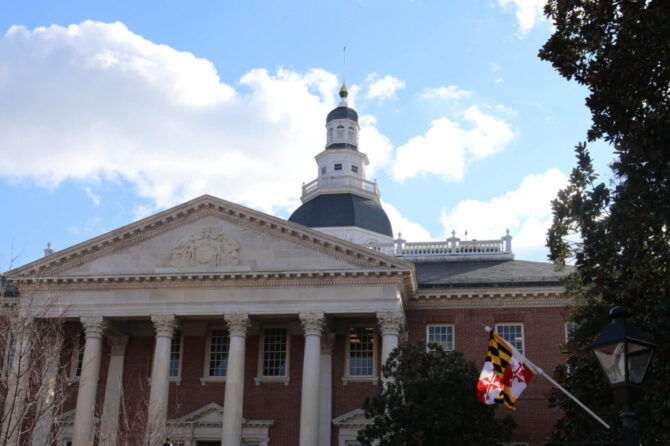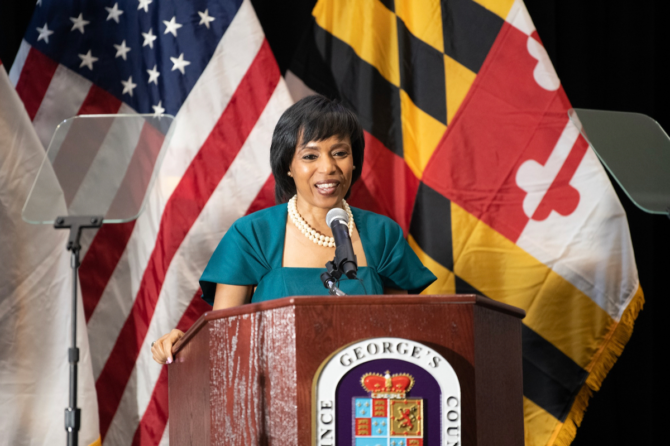MARYLAND MATTERS: House and Senate leaders ended a second round of budget talks Monday with terse exchanges and no resolution on a $1.2 billion revenue package and no agreement on when they will meet next.
Senate Budget and Taxation Chair Guy Guzzone (D-Howard) signaled a willingness to compromise on several issues to bolster the state’s Transportation Trust Fund. House Appropriations Chair Ben Barnes (D-Prince George’s and Anne Arundel) said more needs to be done to address billions in revenue shortfalls for transportation and education.
“The governor has said the House of Senate should sit down and compromise,” Barnes said, speaking to Guzzone during a Monday afternoon budget conference committee meeting. “But let’s be clear: compromise doesn’t mean doing nothing. And, Mr. Chairman, thank you because your proposal was not nothing, but it also doesn’t mean doing so little that we’re not actually solving any of the problems.”
In the broad sense, the House and Senate generally agree on a $63 billion budget that represents some changes from the one introduced by Gov. Wes Moore (D) in January.
Guzzone and the Senate continue to balk at broad-based taxes and gambling expansion that were inserted by the House into a companion budget reconciliation bill. There does appear to be a willingness on the part of the Senate to discuss some targeted fees.
“Basically, they’ve offered us 10% of what we asked for,” said Del. Courtney Watson (D-Howard), chair of the House Appropriations Transportation Subcommittee.
“We do believe it needs to be done this year, for all the reasons that we stated,” said Watson. “We know what the needs are. We know how short we are. We know what the cuts are. We know we have unknown expenses — the Key Bridge. We just don’t see the point of waiting” to raise revenues.
Included by Guzzone as possible compromises were higher registration fees for all-electric and hybrid vehicles. Guzzone also expressed a willingness to discuss a fee on ride share services such as Uber and Lyft, highway work zone fines and document fee increases. He also suggested a possible compromise on a House proposal to base vehicle registration fees based on vehicle weight.
Watson said the House gave senators a “menu of ideas” to review.
“The point is, we’re open to it,” said Watson. “We’re open to whatever they think is more palatable in terms of raising revenue for transportation.”
The committee ended its work Monday without an agreement on a budget. They also left without a plan on when they would meet next. The 90-day session is scheduled to end at midnight on April 8.
Barnes suggested returning every afternoon until a deal is reached. Guzzone told Barnes he would “have to get back to you on that.”
The conference committee met on the same day the legislature is technically required to pass a budget.
Because of the lack of a final deal, Moore issued an executive order that would keep the legislature in session for an additional 10 days beyond next Monday’s scheduled finish, if necessary. If the House and Senate do not reach an agreement, they would have to remain in session but could only focus on the budget.
Such orders are not unprecedented.
“We have just seen an unprecedented tragedy in our state,” Moore said in a statement. “Tonight’s procedural step allows the General Assembly to continue working towards a final budget that makes Maryland safer, more economically competitive, more affordable and the state that serves while we navigate the impacts of the collapse of the Francis Scott Key Bridge. It remains vital that the Senate and the House find compromise as soon as possible, pass the budget, and provide certainty at this challenging and uncertain time.”
Moore so far has expressed neither direct support nor opposition to taxes. He has repeatedly said any increase would have to meet a high bar. The exact standard has not been defined.
There seems to be little disagreement about the looming fiscal problems.
“There’s no disagreement on the need, but the disagreement is on when to raise revenues,” said Watson. “We just think let’s do it and start taking care of some of these projects now.”
Guzzone questioned the timing of asking taxpayers for more in an uncertain time when so many are still feeling the pinch of inflation.
“I guess the bottom line too, is that what we’re talking about here is going to the residents of Maryland and say what are you willing to pay to accomplish these things?” Said Guzzone. “How much are you willing to dig into your pocket?”
Both sides, so far, appear equally entrenched.
Guzzone highlighted House proposals that eliminate the trade-in exemption when taxing a new car purchase.
“We’ve got a number of proposals that we’re dealing with transportation and cars which makes logical sense,” he said. “But let’s also remember with the port where it is, in the situation that it is today, and the fact that the lifeblood of port is the automobile business that comes in and out. To me it seems like the wrong time to be considering going for that extra level of taxes and asking the residents of Maryland to raise on that cause.”
House leaders including Barnes, Speaker Adrienne A. Jones (D-Baltimore County), Environment and Transportation Chair Marc Korman (D-Montgomery) and Ways and Means Chair Vanessa E. Atterbeary (D-Howard) last month proposed $1.2 billion in revenues. The proposal wipes out the six-year transportation gap and makes inroads to funding the Blueprint for Maryland’s Future in the coming years.
Senate leaders took a hardline stance early against broad-based tax bills. They have rejected a House proposal to impose combined corporate taxing based on a company’s earnings worldwide. Additionally, Senate leaders said they will not pass an expansion of gaming to allow casino-style games on phones and other electronic devices.
The Senate also wants to wait until a blue-ribbon transportation commission completes its work. The Transportation Revenue and Infrastructure Needs Commission is expected to make final recommendations on how to modernize paying for road and transit projects. That report is due at the end of the year.
Earlier this year, the commission made two recommendations.
The first would charge owners of all-electric and hybrid vehicles a surcharge on their vehicle registration. The fee, assessed every two years, is meant to bring those owners in line with the fuel taxes paid annually by gas-powered vehicle owners.
The commission also recommended toll increases focused on vehicles registered out of state. That recommendation now appears stalled for this session.
A Senate effort closely followed the commission recommendation. It was tabled because of complications in implementing increases on out-of-state vehicles.
The House proposed taking $75 million annually for 10 years from the Maryland Transportation Authority — an amount equal to that which the state contributed to help build the Intercounty Connector.
The Senate opposed the proposal before the collapse of the Francis Scott Key Bridge.
“What has happened, tragically in Baltimore with the Key Bridge, we thought it best to put that to the side,” said Guzzone.
Also included in the House revenue package is a proposal to expand the state’s gambling options into iGaming — casino-style games including live dealers that would be available on phones and other electronic devices.
Guzzone and other Senate leaders have rejected both the corporate tax and gambling proposals, while House leaders seek swifter remedies.
“We can’t just keep kicking the can down the road, down the road and waiting for the success of the next generation of kids,” Atterbeary said. “We’ve got to start now. And so, part of the House package did include iGaming that would directly be tied to the Blueprint be directly tied to education and also combined reporting. Those were our solutions and so it would be nice to get a response or start having a conversation about the Blueprint.”










